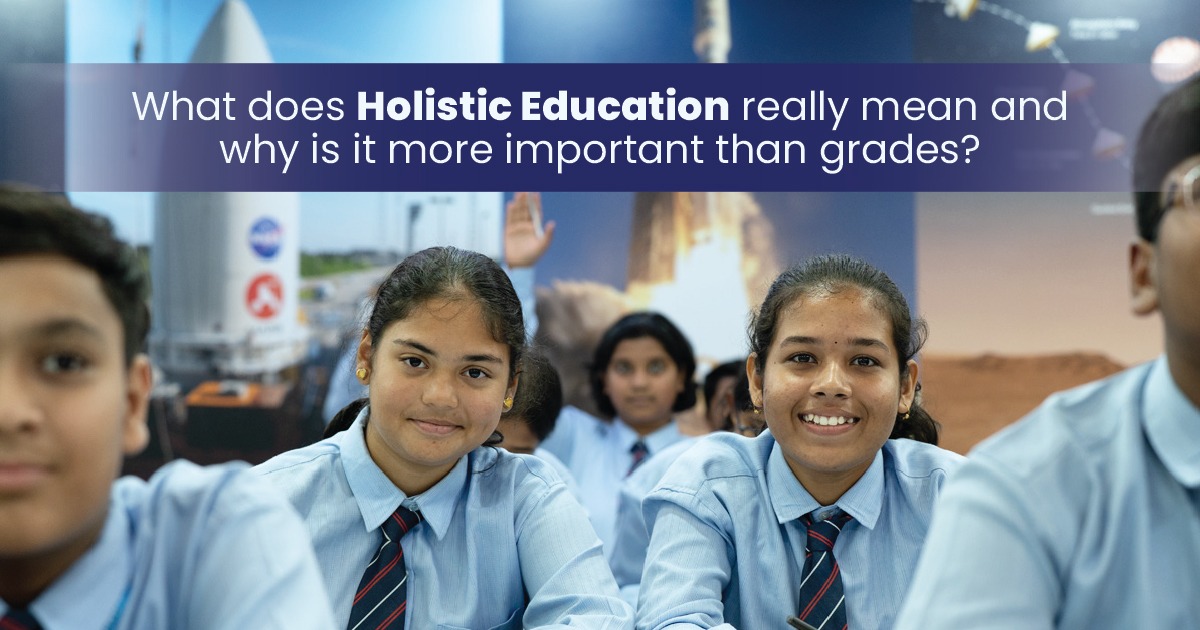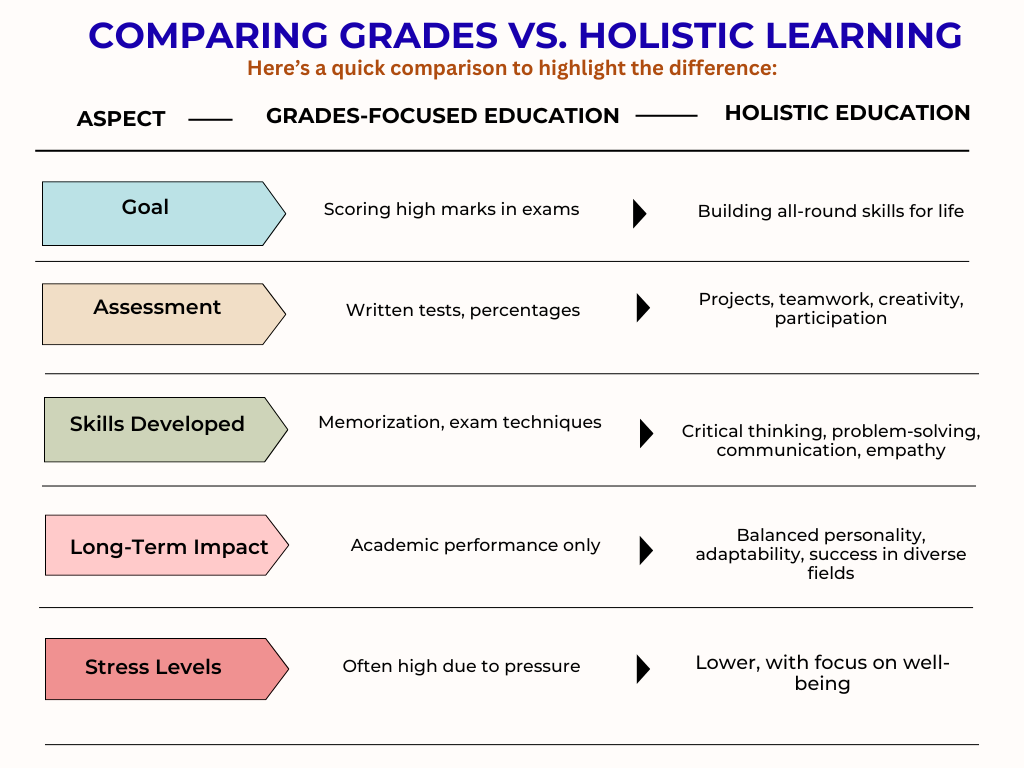- September 12, 2025
- KT Global School
- 0

Introduction
For generations, academic grades have been seen as the ultimate measure of a child’s success. Parents anxiously await report cards, students compete for higher percentages, and schools are often judged by their results. But in today’s rapidly changing world, one question is becoming more important than ever: Are grades enough?
The answer, increasingly backed by educators, psychologists, and even employers, is no. While grades measure academic achievement, they cannot capture creativity, resilience, empathy, or the ability to navigate real-life challenges. That is where holistic education steps in.
For parents looking at the top 10 CBSE schools in Odisha, understanding what holistic education really means—and why it matters more than grades—can help them make more informed decisions about their child’s future.
What is Holistic Education?
Holistic education is an approach that focuses on the overall development of a child—mind, body, and spirit—rather than just academics. It recognizes that every child is unique and that true success comes not only from intellectual knowledge but also from emotional intelligence, social skills, creativity, and physical well-being.
In simple terms, holistic education answers the question: “What kind of person do we want our children to become?”—not just “What marks did they score?”
Key elements of holistic education include:
Academic growth – mastering subjects, critical thinking, and problem-solving.
Emotional well-being – developing self-confidence, resilience, and empathy.
Physical development – fitness, sports, and healthy lifestyle habits.
Creativity and expression – arts, music, theatre, and innovation.
Social awareness – teamwork, leadership, and community responsibility.
Why Grades Alone Are Not Enough
Grades measure a child’s ability to recall, apply, and present information during exams. While important, they do not reflect:
➤ How well a child works in a team.
➤ Their creativity in solving new problems.
➤ Their ability to manage stress or bounce back from failure.
➤ Their values, ethics, and empathy towards others.
Consider this: Many of the world’s greatest leaders, entrepreneurs, and artists were not “toppers” in school. What set them apart was their vision, creativity, persistence, and leadership—qualities nurtured through holistic education, not just grade-focused learning.
Why Holistic Education Matters More Than Ever
1. The Future Workforce Demands More Than Marks
Employers today value soft skills such as communication, teamwork, adaptability, and problem-solving. A child who only focuses on grades may struggle in the workplace, while one who has a balanced, holistic education is more likely to thrive.
2. Emotional Health Cannot Be Ignored
Academic pressure is one of the leading causes of stress among students. Holistic education teaches children how to manage emotions, handle setbacks, and stay mentally healthy—skills far more valuable than just memorizing formulas.
3. Lifelong Learning is the Goal
In a world where careers and industries change rapidly, children must become lifelong learners. Holistic education nurtures curiosity and adaptability, ensuring that learning doesn’t end with a school exam but continues throughout life.
4. Balanced Development Shapes Strong Individuals
Grades may open doors to higher education, but character, creativity, and resilience open doors to success in life. Holistic education helps children become well-rounded individuals who can balance personal goals with social responsibility.
Holistic Education in Practice
What does holistic education look like in real classrooms? Here are a few examples:
★ Project-Based Learning: Instead of rote memorization, students work on real-world projects that combine science, math, and creativity.
★ Sports and Physical Activities: Fitness is treated as essential, not optional, for building discipline and teamwork.
★ Arts and Creativity: Music, theatre, and visual arts are integrated into learning to encourage expression and imagination.
★ Life Skills and Values: Schools encourage discussions on ethics, leadership, empathy, and environmental awareness.
★ Technology and Innovation: Children are trained to use technology responsibly and creatively to solve modern problems.
Many of the top 10 CBSE schools in Odisha already include these practices, ensuring that students receive more than just academic knowledge.

What Parents Should Look For
When exploring the best CBSE schools in Bhubaneswar or the top 10 CBSE schools in Odisha, parents should look beyond board results and ask:
★ Does the school balance academics with sports, arts, and co-curriculars?
★ How does it support emotional well-being and mental health?
★ Are students encouraged to explore interests beyond textbooks?
★ Does the school focus on real-world skills like communication, leadership, and teamwork?
Choosing a school that emphasizes holistic development will ensure that children are not just exam-ready, but life-ready.
Final Thoughts
Grades have their place—they reflect effort, discipline, and academic understanding. But they are not the ultimate measure of success. Holistic education goes deeper, shaping children into confident, curious, and compassionate individuals prepared for the challenges of tomorrow.
For parents, the real question is not “What marks did my child get?” but rather “What kind of person is my child becoming?”
When we shift focus from grades to growth, we empower children to reach their fullest potential—not just in school, but in life.
